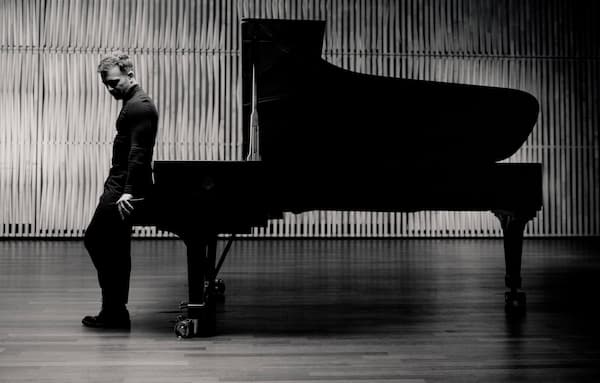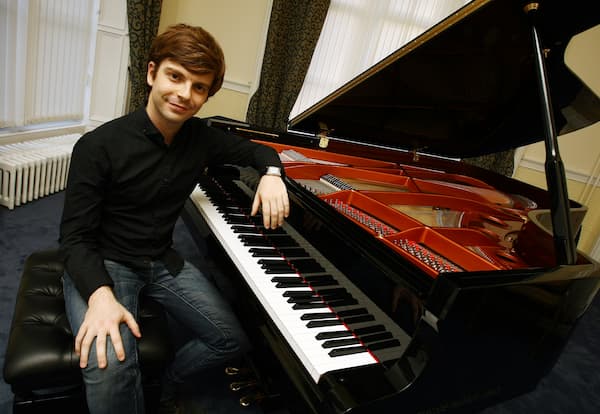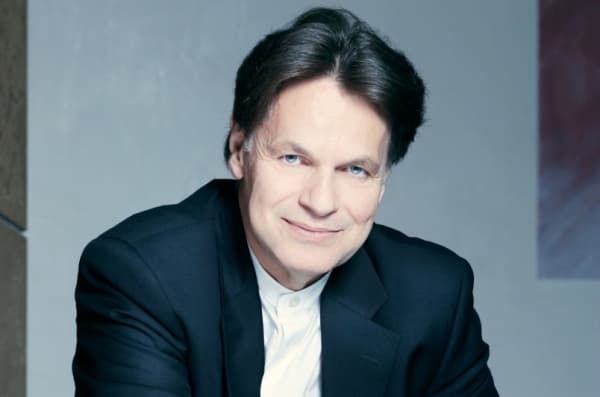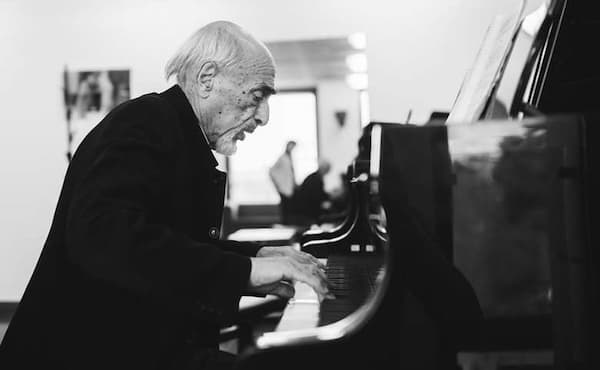French pianist David Kadouch is celebrated for his profound and technical prowess and his expressive musicality. An internationally acclaimed soloist and chamber musician, Kadouch distinguishes himself by the meticulous construction of his recital programmes, the eclecticism of his concerto repertoire, and his spotlight on forgotten composers. As a multiple prize winner, Kadouch was considered a “Young Talent Revelation,” and in 2011, he was named “Young Artist of the Year” by the International Classical Music Award committee.
David Kadouch Plays Beethoven’s Rondo in G Major, Op. 129
Childhood

David Kadouch
David Kadouch was born on 7 December 1985 in Nice, and he showed exceptional talent at a very early age. His parents were not professional musicians but they had a deep appreciation for the arts. When his two sisters started piano lessons, David quickly followed suit. He remembers little of his first lessons, just “strange memories of his teacher’s cat, a little notebook where she wrote my work for the next week, and my fingers, which she thinks are never articulated enough.”
Before long, Kadouch entered the Nice Conservatory in the class of Odile Poisson. He described Poisson as an extraordinary professor and “a great musician who helped me to discover music.” Kadouch started performing in public and he soon participated in various local competitions. As he explained, “Poisson believed in me from the very beginning, and she prepared me for the entrance competition at the Paris Conservatory.
Béla Bartók: Out of Doors, BB 89 (David Kadouch, piano)
First Exposure

David Kadouch
At the tender age of 13, Kadouch won the Young Talents Competition in Milan, and he was invited by Itzhak Perlman to join the recitals at Metropolitan and Carnegie Hall in New York. Only one year later, he was invited to play in the Bolshoi Hall of the Tchaikovsky Conservatory in Moscow. He recalls, “it was an extraordinary experience performing in such a legendary room.”
For Kadouch, becoming a pianist was a very natural choice. “The more I worked, the more I played, the more I realised my love for music.” However, he also loved to read and initially dreamt of being a professor of literature. As he explained, “I like to go through a text, analyse it, and try to find its hidden meaning.” In the event, Kadouch entered the Conservatory of Paris at the age of 14 and furthered his study in the class of Jacques Rouvier. “He taught me how to work alone, and he always trusted me in my artistic choices,” recalled Kadouch.
David Kadouch Plays Chopin’s Scherzo No. 1, Op. 20
Paris and Madrid

Michel Béroff
Kadouch also studied with Michel Béroff, one of the most prominent French pianists and pedagogues, at the Paris Conservatory. In fact, Béroff’s deep understanding of both the technical and interpretive aspects of piano playing had a major influence on Kadouch’s musical education. He guided him towards a nuanced and expressive approach, particularly in his interpretation of the French repertoire, and he helped him to develop the technical facilities needed for a professional career.
During his time at the Paris Conservatory, Kadouch participated in various national and international piano competitions, and he graduated from the Paris Conservatory at the age of 17. As he remembers, “I was too young to proceed without a teacher,” and he decided to join the class of Dimitri Bashkirov at the Reina Sofia Conservatory in Madrid. Kadouch recalls, “I had known his name for many years, and I had listened to several of his students in concert and even participated in master classes he gave in Europe.”
Nicolai Medtner: Forgotten Melodies, Op. 38 – No. 1 Sonata reminiscenza (David Kadouch, piano)
Significant Influences

Dimitri Bashkirov
Dimitri Bashkirov became one of Kadouch’s most significant teachers. “It was a dream to be able to study with him,” explained Kadouch. “He had very few students, and he was always present, always available. However, he was also very tough and demanding. He is first and foremost my mentor, a great pedagogue that I respect and love deeply.” Alongside his studies with Bashkirov, Kadouch also took masterclasses with some of the most prominent musicians and pianists of our time.
Itzhak Perlman opened his eyes to the idea of sharing music and the pleasure and joy of playing, whether for daily practice or concerts. Maria João Pires taught him how to analyse a score and to make sure nothing is ever taken for granted or automatic. Finally, Kadouch describes Daniel Barenboimz as “a man of extraordinary culture. To be in touch with him is to learn about music, but also about philosophy and literature. He is a great pedagogue because he can explain and formulate everything with great simplicity.”
For more of the best in classical music, sign up for our E-Newsletter
